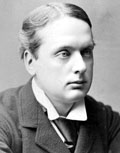 |
Archibald Philip Primroseb. 7 May 1847, London |
| Ministerial offices: | Under Secretary of State, Home Office (8 Aug 1881 - 7 Jun 1883) |
| First Commissioner of the Board of Works (13 Feb 1885 - 9 Jun 1885) | |
| Lord Privy Seal (5 Mar 1885 - 9 Jun 1885) | |
| Foreign Secretary (6 Feb 1886 - 20 Jul 1886, 18 Aug 1892 - 11 Mar 1894) | |
| First Lord Commissioner of the Treasury, Lord President of the Council and Leader of the House of Lords (5 Mar 1894 - 22 Jun 1895) | |
| Names/titles: | 5th Earl of Rosebery [from 4 Mar 1868], Viscount of Rosebery, Viscount of Inverkeithing, Lord Primrose and Dalmeny, Lord Dalmeny and Primrose in the peerage of Scotland, also Baron Rosebery (UK) |
| Biography: | |
Archibald Primrose was the eldest son of Lord Dalmeny and the grandson of the 4th Earl of Rosebery, belonging to Scottish aristocracy. He became the 5th Earl of Rosebery on his grandfather's death (4 Mar 1868) and took a seat in the House of Lords. Rosebery was educated at Eton and entered (1866) Christ Church College, Oxford, but had to leave when the university authorities objected to his owing a racehorse (1869). A liberal, he was, nevertheless a staunch upholder of the British Empire. He first became a public figure when he effectively managed William Gladstone's Midlothian campaign. In 1881 he became Under Secretary at the Home Office (1881-1883) with special responsibility for Scotland, but he was not convinced that Gladstone showed real interest in Scottish affairs and resigned after two years. Following the fall of Khartoum, Rosebery put himself at Gladstone's disposal and took office as Commissioner of the Board of Works (1885) with a seat in the Cabinet as Lord Privy Seal (1885), but the Government resigned in June 1885. Rosebery returned to be Foreign Secretary (1886, 1892-1894) in Gladstone's two last administrations. When Gladstone resigned on 2 Mar 1894, Rosebery succeeded him as Leader of the Liberal Party (1894-1896) and became the Queen's choice to head a new administration. He was appointed First Lord of the Treasury, Lord President of the Council and prime minister on 5 Mar 1894. Rosebery failed to settle the conflicts within the Liberal Party and found it difficult to lead a Government from the House of Lords, which rejected all Liberal legislation except the budget. He was increasingly at odds with his Chancellor of the Exchequer Sir William Harcourt and was castigated in the Commons for blocking Irish home rule. In little over a year the Government fell apart for lack of leadership in the Cabinet. Following a vote of censure on a minor issue on 21 Jun 1895, Rosebery went to Windsor, where he handed his resignation to Queen Victoria (22 Jun 1895). The next year he also resigned (8 Oct 1896) as Leader of the Liberal Party. In February 1902 Rosebery became President of the Liberal League. In 1910 he put forward motions proposing reform of the House of Lords. Biography source: [1, pp. 212-216] |
|
| | |
| [1] | Englefield, Dermot; Seaton, Janet; White, Isobel (eds.) Facts About the British Prime Ministers: A Compilation of Biographical and Historical Information. New York: The H.W. Wilson Company, 1995. online |
| Image: photograph of the 5th Earl of Rosebery, c. 1880. | |
